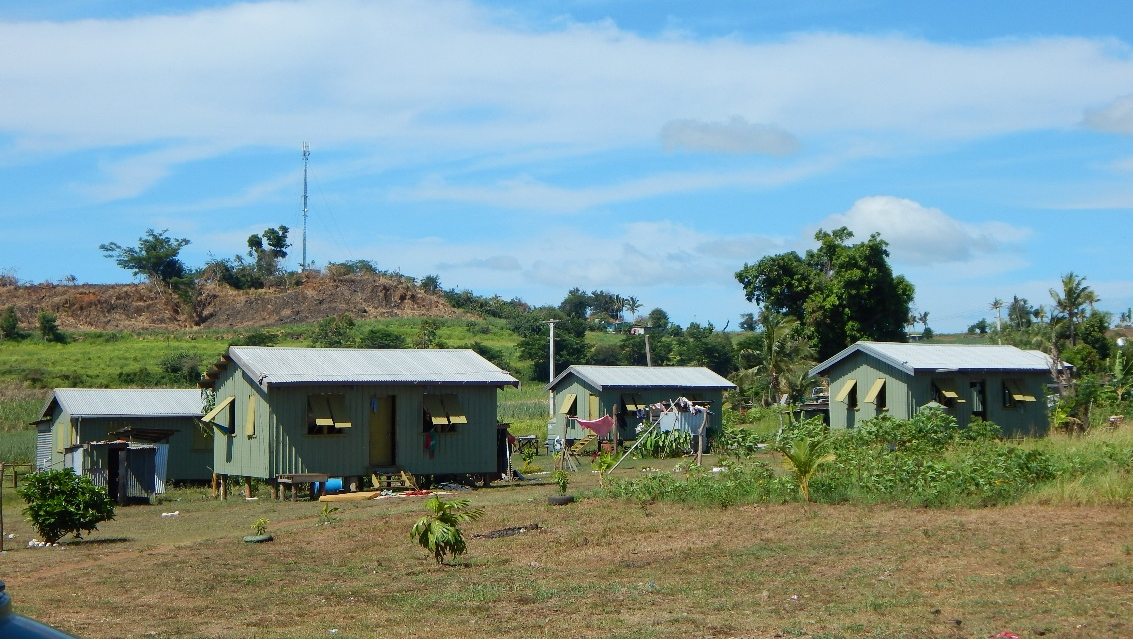
Photo: Cyclone-proof houses in Etatoko, one of the first communities resettled as a result of climate change in Fiji, a small island developing state in the South Pacific. (c) Andreas Neef.
SUMMARY
A recent ruling of the UN Human Rights Committee, which stated that people cannot be sent back to countries where climate change impacts place them in immediate danger, was treated by many commentators as a landmark protection for environmental migrants. As Professor Andreas Neef (University of Auckland) explains in this feature, the reality is more complex. Recipient of a 2020 WUN Research Development Fund award, a consortium led by Professor Neef will advance interdisciplinary research into climate-induced migration. It aims to help improve policies through a better understanding of the complex drivers of migration and displacement associated with climatic changes.
STORY
Predictions of the number of people who will be permanently displaced by climate change and related disasters in the near future vary dramatically. The Stern Review on the economics of climate change, commissioned by the UK Government in 2006, noted predictions of up to 1 billion people displaced by 2050. At the conservative end are estimates that 25 million people will be displaced. As the International Organization for Migration (IOM) highlighted, there is thus a factor of forty between predictions at the top and bottom of the scale.
To shed light on the challenges of climate-induced migration, a new consortium comprised of twelve WUN members and five additional members, led by Professor Andreas Neef (University of Auckland), has launched in 2020 with a grant from the Research Development Fund and additional support from participating universities. The group has established a partnership with IOM, the primary agency for international action in this field, and will produce agenda-setting analysis of scholarship, policy, and legal frameworks.
While there is a non-binding framework for cross-border displacement resulting from climate change, Professor Neef expressed reserve about prospects for protection equivalent to refugee status. The result of the Human Rights Committee ruling, he explained, was really to insist that ‘the threshold of where you go from misery to a life without dignity has not yet been reached’. As long as it can be claimed that there is still time to adapt, he observed, potential destination countries will continue to argue that they are not obliged to provide protection.
Conversely, Professor Neef warned that a preoccupation with people who are mobile carries the risk of overlooking those left behind. Mobility is often more accessible to wealthier individuals with higher education, he explained, contributing to brain drain in the societies they leave behind. ‘The really poor and marginalised people, in very remote areas where climate change hits by drought, for instance, they have no way to find resources to migrate internationally. They will be trapped in those areas or migrate to cities and become squatters, facing the prospect of moving from one misery to another.’ Researchers are keen to look at the fate of those left behind.
To illustrate potential research areas, Professor Neef pointed to Indonesia’s decision to relocate its capital from Jakarta to Kalimantan, on Borneo island, by 2024. Some parts of Jakarta, which has more than 10 million residents, have sunk 2.5m in the past decade. The planned move raises questions about its motivations and any unstated agendas, the environmental cost of establishing a government base in a hitherto pristine area, and who will remain in the sinking city after the administration relocates.
The consortium aims to inform policy at multiple levels, including international organisations and governments from migration and destination countries—keeping in mind that much displacement will be internal rather than across borders. Its members’ expertise includes economics, psychology, public health, population studies, anthropology, archaeology, architecture, sociology, engineering, human geography, public policy, and development studies. They plan to make WUN seed funding the foundation for future research to trace how people decide whether to migrate internally and across borders as a result of climate change, with the potential to use long-term historical data as well as study current crises.
—
Professor Andreas Neef is Principal Investigator of the WUN Interdisciplinary Research Group (IRG) on Climate-Induced Migration: Global Scope, Regional Impacts and National Policy Frameworks. The research team includes the University of Alberta, The University of Auckland, University of Bristol, University of Ghana, Maastricht University, University of Massachusetts Amherst, University of Rochester, University of Southampton, Tecnologico de Monterrey, University College Dublin, The University of Western Australia, and the University of York. For more information see their WUN IRG page.